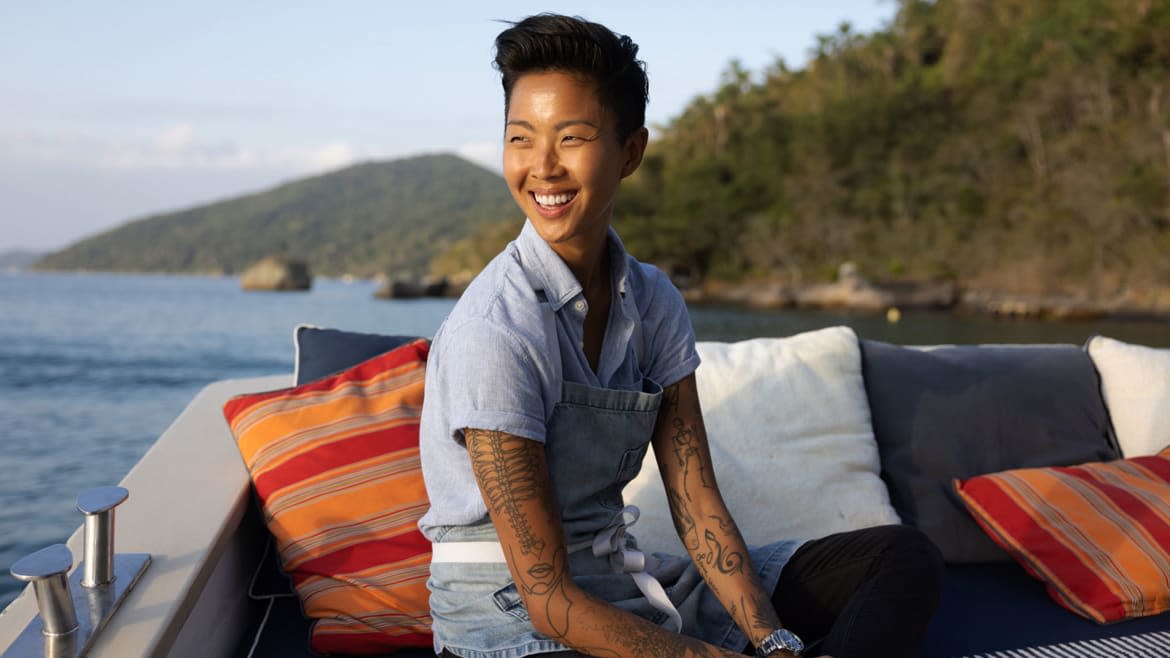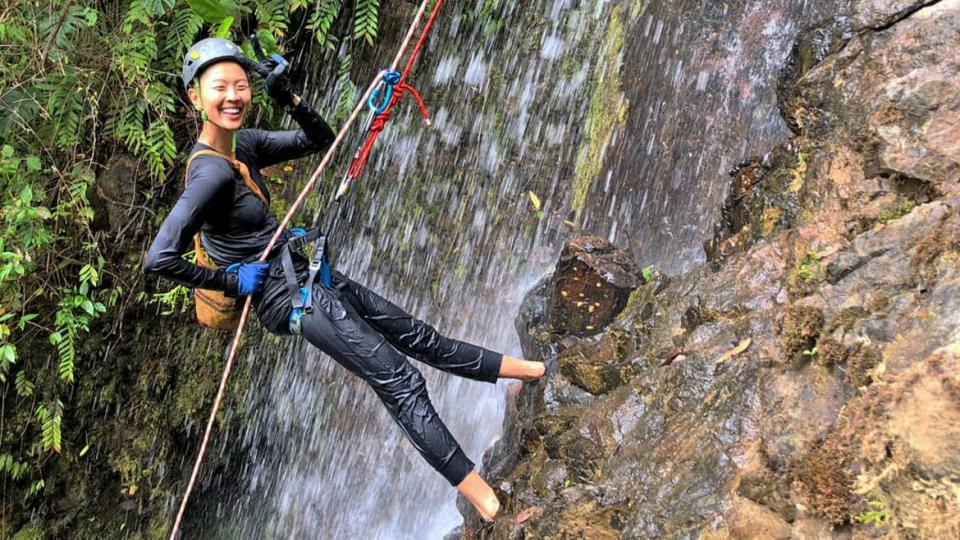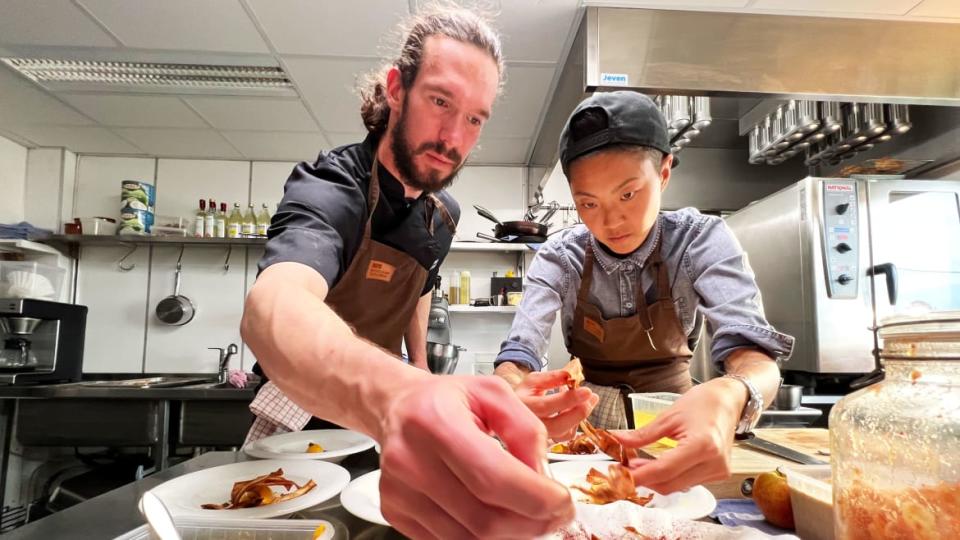Kristen Kish on Facing Her Fears and Turning Down ‘Top Chef: World All-Stars’

Kristen Kish never wanted to be on Top Chef. Now that 10 years have passed since she fought her way back from elimination to become the second woman to earn that coveted title, she says she has even less interest in returning to the competition again.
It makes sense, given the many other opportunities on her plate.
Since winning Season 10 of Top Chef in 2013, Kish has become a bona fide food TV star, co-hosting 36 Hours on the Travel Channel, Fast Foodies on TruTV, and Iron Chef: Quest for an Iron Legend on Netflix. This year, she is going solo with Restaurants at the End of the World, an excellent new four-part series that premieres on NatGeo on March 21 at 10 p.m. and will be available to stream on Disney+ after that.
The new show brings Kish to far-flung locales like Panama’s cloud forest, where she harvests watercress from a waterfall, and the glaciers of Svalbard, Norway, which provide ice for a particularly inventive, if unappetizing, cocktail. Working with the acclaimed chefs who operate these remote restaurants, Kish channels her Top Chef mastery to help create exquisite meals with extreme restraints.
And she does it all while remaining ridiculously charming and surprisingly cool under pressure, especially given how much anxiety she now admits she felt while competing for the Top Chef crown. We talked about all of it during some rare downtime at home when she was neither filming nor cooking at her Austin restaurant Arlo Grey.
“I’m fully enjoying being able to talk to you in the comfort of my own sweatpants,” she joked.
Below is an edited and condensed version of our conversation.
I don’t know how adventurous of a traveler you are in your own life, but what appealed to you about this concept? And was it scary at all to think about some of the things that you were going to have to do for this show?
I think the most exciting part for me, even before we started digging into the details of what I’d actually be doing, was partnering with National Geographic. I grew up with my dad getting the magazines when I was a kid; we had baskets and baskets in every bathroom. You’d hold on to these magazines for a very long time. I mean, I was hooked as soon as they said National Geographic. And then we started diving into what the show is and what it meant and what I would be willing or not willing to do. And I think in these first four episodes, everyone’s kind of finding their feet. It’s a new series, we’re trying to figure out what sticks, what works, what doesn’t. And so hopefully I’m fortunate to be able to do many more of these. But I will say, I think I’ve always been an adventurous traveler on my own. As I’ve gotten older, I’ve gotten married, life means different things to me now and I’m obviously considering another human, my wife, in this scenario. And so my risk assessment has definitely changed. But being able to do it with National Geographic allows me to push those boundaries more than I would do it for myself.
Yeah, I was wondering in that first episode when you were rappelling down a waterfall to pick some watercress, what was going through your mind?
So that was one of the very first things they pitched as this physical activity. Panama is our premiere episode and it was also the first thing that we shot. And so this is all just brand new. So they’re like, “Would you rappel down a waterfall?” I was like, “Sure… yes, I’ve never done it before.” I’ve been rock-climbing in a gym before, but that’s as far as I’ve gone. I was very excited. I will say, one of the hardest parts of that was something that doesn’t even get shown on screen, and that is the hike to the top of this waterfall. That hike alone was an adventure, and I was like, oh my God! I’m winded, and the elevation is different, and I feel like I’m just even more winded because of it. That was more physically challenging for me than actually rappelling down a waterfall, but it was an experience that I would happily do again.

Yeah, I was watching it and thinking there has to be a better way to get watercress…
[Laughs] I mean, part of the appeal of this show, for me especially, is when you go through these physical challenges of something in order to get an ingredient, or just to have an experience, your whole outlook changes. At the end of the day, grabbing watercress or not grabbing watercress, having done that in a place that [chef Rolando Chamorro] considers his backyard, that’s the heartbeat right there.
The show is really not a typical food travel show where you go to a city and eat at restaurants and do that typical thing. Did you think about how you wanted to make something different from those shows that we’ve seen a lot?
I think the thing that will set this apart—and it’s the same way that restaurants are set apart by chefs—is when you infuse your own story and you come with a purpose that only you have. The catalyst to my love of travel, and why I want to travel, and why I’ve always dreamt of doing it, was I was born in Seoul, I was adopted at 4 months old, and I was raised in Michigan. There is not a day that goes by that I don’t think about the fact that I was chosen into a family, and I could have been chosen into any family. And the idea of travel and exploring someone’s life and understanding who they are, and why they do what they do, there’s so many different variables that led me to where my life is. So that idea of travel, I always carry that curiosity with me, because it’s like, well, this could have been my family, too.
I think this is at least your fifth TV show that you’ve been involved in. Going all the way back to when you first auditioned for Top Chef, which was your first time on TV, what did you imagine that experience would bring for yourself, for your career?
Well, I didn’t want to go on Top Chef. So it wasn’t that I was like, “Oh, TV, this thing really excites me and I’m going to go for it!” I went on Top Chef because my boss made me. I was working for Barbara Lynch at the time in Boston, and she said, “You know, the producers are asking if we have any female chefs that would be good for the show.” She didn’t ask me, she said, “I already put your name in the hat.” And I was like, “OK, whatever, I don’t have to do this if I don’t want to.” Eventually she kept being like, “The producers want to have a call, and you have to send in this video,” and I’m like, “I don’t want to do any of this.” But I think at that time in my life, a lot of things were colliding. I was coming into my own. I was not feeling bored at work, but I was certainly getting used to the everyday routine and that idea of subconsciously wanting to shake it up. I think that was really what drove me. And I always said with that entire process, as long as I can say no at any time, I’ll keep saying yes until I don’t want to anymore. So that kind of kicked this whole television thing off, which was never really my intention.
And I don’t know what happened. I think the more and more I started to become myself, the more and more these television product projects started coming. Which proves that I didn’t have to emulate this idea of success, I just needed to be myself and what will come will come. And so I went through the same thing of, “I’m going to keep saying yes until I don’t want to say yes anymore” with all these projects. You’d have to ask these TV people why they keep coming to me. I don’t know. I feel very grateful for it, and I feel incredibly fortunate to be able to do these projects, because I say yes to the ones that really challenge and intrigue me the most. But it was never the plan, and I never would have thought, being this child who was incredibly self-conscious, socially anxious, I get stage fright very easily, to be on television. My mom sometimes still can’t believe it. She’s like, “How did this happen?” I don’t know.
How has your level of comfortability on television evolved from the very beginning of Top Chef to where you are now?
Well, Top Chef was one thing because I didn’t know any better and all I had to do was cook. I didn’t have to host anything, I didn’t need to be the voice of anything, I had to do what they told me to do. And as these projects have evolved, I still get nervous. I think that’s a good thing, because I still want to do a great job. But I think I’ve gotten more comfortable with just being me and saying that’s going to be enough and that’s going to be OK. Instead of trying to be this character or this host that I see as successful on other television shows that I watch. So I’m still anxious, still nervous, but I think that I’ve gotten comfortable with having that feeling.

I can’t believe that 2023 is the 10-year anniversary of when you won Top Chef. What do you remember most about that moment of actually winning the competition?
You know, I remember a lot, but I also kind of blanked on a lot of it as well. They don’t do this every single season anymore, but for my season, we filmed the majority of the season and then everything stopped. There’s this hiatus and everyone went home before the finale. So I had this time to watch it all play out. But during that time a lot of people either knew they were in the finale or they knew that they weren’t in the finale. I was living in the place where I’d finished Last Chance Kitchen in Alaska, but I still had to do two or three more and then make it into the top three, and then make it into the top two, and then eventually win. So going into the finale already, it was kind of like, I’ve already made it this far, and I’m off that adrenaline high of the majority of the season. So I went in slightly more calm. And more OK with “whatever is going to happen was going to happen,” because I’ve already made it this far.
Like a lot of the contestants over the years, you have become a real part of the Top Chef family, including as a guest judge on other seasons. Was it strange to go from being a contestant and viewing the judges as these sort of intimidating figures to then sitting side by side with them on the other side of the table?
I don’t know what it is, but I remember when I first stood next to Padma [Lakshmi]—I’ve had conversations with Padma in person, I’ve hung out with her over the years and Gail [Simmons] and Tom [Colicchio]—but you put me back into that space and my nerves, the thick ball of saliva that collects, and you’re like, “I don’t think I can talk.” It just comes rushing back. That’s a feeling that I had every single day competing. And so it’s a surreal moment. But I don’t think I ever got used to it. I’m not like, “OK, now I can relax because I’m on the other side.” Absolutely not. I’m still completely a ball of anxiety.
Tom Colicchio Talks ‘Top Chef’ Houston and Harassment Allegations Against Winner Gabe Erales
As we’re talking, they’re launching this big 20th season “World All-Stars” edition. Did they come to you and ask if you were interested in competing in that?
Mm-hm.
And what was your reaction?
I’m not on it!
So they did want you, but you were not interested?
I guess. I don’t know how much—whatever, yes, I was offered and I declined and that was really what it was. You know, it’s not for me—that competitive nature of being back in that space—for a multitude of different reasons. It did not fit into my schedule, my life, my emotional and mental wellbeing. There’s some people that are cut out for it. I am not one of them.
Yeah, the chefs who go back again and again—and some have done it three, four times—are they just gluttons for punishment, or what is going on there?
I think they’re just good at it! They know they’re good at it.
Well, you were pretty good at it, too.
I’ve had this conversation with a couple of friends, and I was like, what I felt inside every single day, did no one see that on the outside? Was I just internally suffering all alone? And that’s what it was. So whatever it was that I projected was, I guess, not what I was feeling on the inside.
You’ve also moved on. You’re hosting this show and doing other things that are maybe more fulfilling or more fun?
I think to just sink into who I am and also learn from a lot of these travels, for me, this is much more personally satisfying than having to compete.
I love that on the new show, even though you’re not competing against anybody, there’s a little element of Top Chef to it. Because you are thrown into these challenges where the chef you’re working with is like, “Here, can you make a dessert? And this is all you have to work with.” Did you think about that at all while you were doing it?
The thing about Top Chef is it’s something that will always live inside of you. It’s an experience that you will never get rid of and you’ll never forget about. And I think even before Top Chef, the idea of cooking on the fly and cooking within a box was always something that I enjoyed doing. I always need a box to cook in. If someone says “cook me anything,” my head just starts to spin. So going on these adventures and having to cook with ingredients that are maybe foreign to me or I’ve never had before, I think that’s just the fun of cooking in general. But yeah, anytime I go into a cooking situation, I like a little bit of that challenge, because if it’s too easy, where is the fun in that?
‘Top Chef’ Winner Buddha Lo on ‘World All-Stars’ Season and Getting Called a ‘Food Snob’
Get the Daily Beast's biggest scoops and scandals delivered right to your inbox. Sign up now.
Stay informed and gain unlimited access to the Daily Beast's unmatched reporting. Subscribe now.

 Yahoo Movies
Yahoo Movies 
